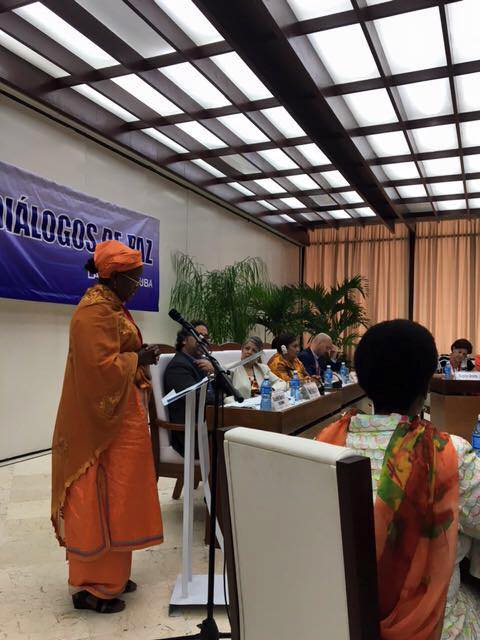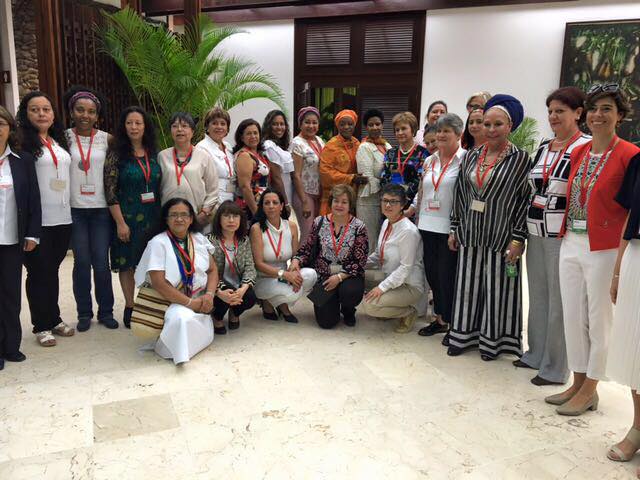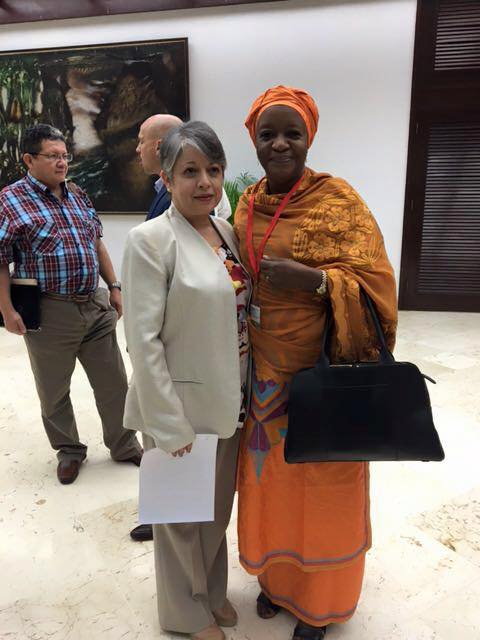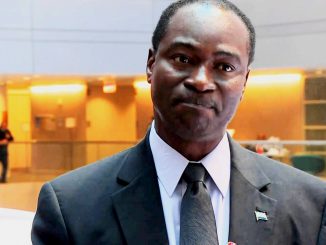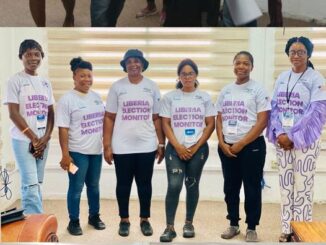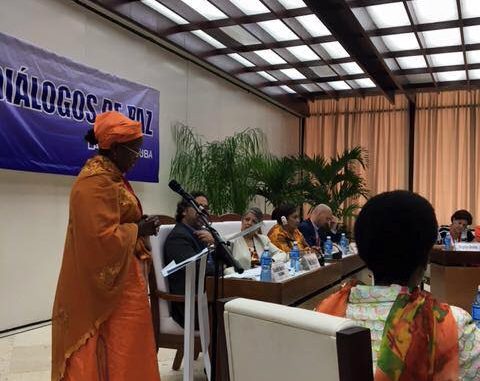
On the 23rd July, Mrs .Zainab Bangura, the Special Representative of the UN Secretary General on sexual violence during conflict, travelled to Havana, Cuba to witness the signing ceremony on the 24th July of an historic agreement on the empowerment of women in Colombia between the Government of Colombia and the FARC-EP.
The two parties have been in conflict for over 50 years, making it the longest ongoing conflict in the Western Hemisphere. This historic and unique agreement signed at the Havana Peace Talks Table is the first ever such agreement signed in the history of conflict resolution.
Together with the Executive Director of UN Women, Mrs. Bangura asked to make statements at the signing ceremony. Below are firstly the joint statement by her and the ED of UN Women and her statement at the signing ceremony .
JOINT STATEMENT ON THE HISTORIC COMMITMENT BY THE GOVERNMENT AND FARC-EP AT THE HAVANA PEACE TALKS TABLE
BY PHUMZILE MLAMBO-NGCUKA, UN UNDER-SECRETARY-GENERAL AND EXECUTIVE DIRECTOR OF UN WOMEN, AND ZAINAB HAWA BANGURA UN UNDER-SECRETARY-GENERAL, AND SPECIAL REPRESENTATIVE OF THE UNITED NATIONS SECRETARY-GENERAL ON SEXUAL VIOLENCE IN CONFLICT
On 24 July 2016, we celebrated with the people of Colombia the historic commitment by the Government and FARC-EP at the Havana Peace Talks Table to ensure that one of the agreement’s fundamental objectives is to promote gender equality and the empowerment of women.
The implementation of this commitment will be the critical test of whether peace will endure, and fulfil the highest aspirations of Colombians for a just, equitable, inclusive and democratic society.
zainab Bangura reading her statement
We have witnessed the culmination of a critical phase of work of the Gender sub-Commission, which is a unique mechanism in the history of conflict resolution.
The gender provisions of the agreement ensure that women’s participation and empowerment are central to main aspects like rural development, political participation and eradication of illicit drugs. The Gender sub-Commission has also addressed the rights of women victims of the conflict to truth, justice, reparation and guarantees of non-repetition, as well as their rights in provisions for the end of the conflict.
With a cross section of the Colombian Women civil society who were also mostly victims of the war.
In the Colombian conflict the level of sexual violence committed particularly against women and girls has been severe. Too often, victims of such crimes suffer in silence and shame. They may be stigmatized, ostracized and marginalized in their communities, resulting in poverty and destitution. In Colombia, the silence around sexual violence in the conflict has been broken, with a firm commitment to afford survivors the justice and support that they deserve.
The United Nations salutes the unprecedented work of the Peace Talks Table and its Gender sub-Commission, which has brought women’s voices into the process. Women are a vibrant force for peace and reconciliation, and this must be reinforced in the final agreement and, crucially, during the implementation phase.
We look forward to the institutionalization of the Gender sub-Commission in post-conflict arrangements, as a guarantor for implementation of the commitments that have been made. This peace process represents an historic opportunity to transform the status of women in Colombian society through fundamental structural change. We must now ensure that women are included in all aspects of decision-making, with specific provisions for gender balance, and in power and wealth-sharing arrangements.
Zainab and Maria – Head of the Colombian Women Government Delegation
The peace process has already reduced the humanitarian impact of the armed conflict. These tangible and significant dividends of the peace negotiations will help to build the crucial momentum for the plebiscite by which the Colombian people will decide on the agreement’s ratification. For transformational change, and for peace to take root, it will be essential to secure the broad participation of women and men, and of all civil society.
This is a moment of great hope. It renews our confidence in diplomacy, and strengthens our belief that other long-standing conflicts, no matter how complex and protracted, can follow Colombia’s example and ‘sign up’ for peace. It is also a testament to friendship, as we acknowledge the discreet but crucial role that countries like Cuba and Norway have played as the formal guarantors of the peace process.
UN Women has had the privilege of accompanying this peace process since 2013, in close coordination with the Office of the Special Representative of the UN Secretary-General on Sexual Violence in Conflict, at the request of the Peace Talks Table. We will maintain our support to the successful closure of the current negotiations and the implementation phase.
We reaffirm our commitment to continue to stand with and support Colombia and its people on their journey toward lasting peace.
STATEMENT OF ZAINAB HAWA BANGURA, SPECIAL REPRESENTATIVE OF THE UNITED NATIONS SECRETARY-GENERAL ON SEXUAL VIOLENCE IN CONFLICT
EVENT OF THE GENDER SUB-COMMISSION OF THE COLOMBIAN PEACE TABLE
Havana, Cuba
24 July 2016
– Snr. Humberto de la Calle, and Commandante Ivan Marquez, respective Heads of Delegation to the Peace Table; – Foreign Minister Holguin, to whom I am grateful for the invitation to be here; – Sisters of the Gender sub-Commission; – Representatives of Cuba and Norway, our hosts and guarantors of the peace process; – Members of Colombian civil society; – Distinguished ladies and gentlemen,
Sexual violence committed in conflict has often been called ‘history’s greatest silence’. That is because the victims of these crimes suffer in silence and shame; stigmatized, ostracized and marginalized in their communities, and often plunged into poverty and destitution as a result.
Meanwhile, the perpetrators more often than not, get away without the least cost or consequence, free to continue in spite of the devastation they have caused.
This is the unacceptable reality in too many places.
Yet in Colombia, due in part to the work of this Gender Commission, the silence around sexual violence in the conflict is broken. These crimes have been acknowledged; the victims recognized; and a sacred commitment has been made to give them the justice, the care and the support that they require, and that they deserve. In the long history of this crime, it is the first time this has happened.
~
I am honoured to be here, alongside my dear sister Phumzile of UN Women, to witness this historic occasion. It is my second time to join you at the peace table here in Havana, and I wish to express my humility for the confidence you have shown in me and my Office to accompany you, in small part, in your journey toward peace.
The establishment of this Gender Commission, and the manner in which it has worked to ensure that all aspects of the agreement promote gender equality and the empowerment of women, is indeed remarkable. This is an unprecedented mechanism and innovation, and its success is crucial for sustainable peace in Colombia. It can also serve as an inspiration for conflict-resolution around the world.
Sexual violence, perhaps more so than any violation of human rights, undermines the possibility of durable peace in its aftermath. It makes reconciliation even more difficult. It devastates not only the victim, but also deeply traumatizes the community.
That is why everyone around this table agrees that addressing sexual violence is a critical priority. Furthermore, it is understood that such violence is rooted in structural gender inequality and discrimination.
Therefore, we must see this peace process as a historic opportunity to transform the status of women in Colombian society through fundamental structural change.
~
When I visited Colombia in March 2015, I had the chance to meet with the Government and other stakeholders to discuss the important legislative and policy measures that have been taken. This includes the reparations programme for victims of sexual violence, and adoption of ground-breaking legislation such as Law 1719 guaranteeing access to justice for victims. Such actions taken by the Colombian Government are among the most advanced responses to sexual violence anywhere, and it is experience that we have begun to use in other counties.
In my meetings with survivors and women’s organizations in Bogota and the Department of Choco, I heard their clear and resounding message –
‘They want peace’,
‘Crimes of sexual violence must be recognized by all’, and
‘There must be guarantees by all parties that it will not happen again’.
I believe that the work of this Commission honours their call. And, we look forward to the institutionalization of the Gender Commission in post-conflict arrangements as a guarantor for implementation of the commitments that have been made.
~
This is a moment of great hope.
The peace process in itself has already reduced the humanitarian impact of the armed conflict. During the period of this dialogue there have been fewer armed clashes, less civilian displacement, and fewer lives lost. These are tangible and significant dividends of the peace negotiations, which will serve as the crucial momentum for the popular referendum that is to come.
But today, I wish to share with you some convictions of my personal experience and the journey to reconciliation and peace of my own country, Sierra Leone:
First – it is the resilience and unrelenting hope of the women of Colombia that has sustained your beautiful country through more than 50 years of conflict, as it did mine. Now, at this historic juncture, it is only by harnessing the power of women that you will ensure that Colombia flourishes to the level of the dreams we all harbour.
Second – for it to be durable, reconciliation and peace must be accompanied by restorative justice. And furthermore, those who have been the victims of sexual violence must see two faces of that justice:
The first is that of accountability of the perpetrators – a clear signal of intent that justice, ultimately, will not be denied; because the crimes they have committed are intolerable.
The second is that of reparation, in the form of the livelihood support that survivors require to pick up the pieces of their lives. This includes provision for their children, many of whom may have been born as a consequence of sexual violence, and who also suffer in the shadow of stigma and shame. Our post-conflict programmes must take these children into account, because if we fail to acknowledge and care for them we may be seeding a future generation of conflict.
Third – the Peace Agreement in its implementation phase will undergo some critical stress tests. Experience elsewhere has shown that women have the power to hold it together at the most difficult moments. So ensuring the ‘buy-in’ of the women of Colombia is one of the most important objectives and practical considerations going forward.
Fourth – in many other places we have witnessed spikes in sexual violence where Disarmament, Demobilization and Reintegration (DDR) programmes have been flawed. Therefore, the design and implementation of the DDR is a crucial issue in which the Gender Commission must be closely involved, including ensuring relevant gender expertise in the concentration sites that will be established.
Finally, it is possible for Colombia to take advantage of the experience of others who have been on this path – to learn from the trials and triumphs of countries such as Northern Ireland, Bosnia, Sri Lanka, Sierra Leone and South Africa.
But at the same time, Colombia’s unique experience, which is exemplary in so many ways, can serve as an inspiration and lesson for others.
Sisters and brothers,
On the road ahead you will surely encounter challenges, perhaps even setbacks, in implementing the letter and spirit of the agreement, and ‘deep-rooting’ the peace. But be assured that the United Nations will continue to stand in solidarity with Colombia, and offer any support that we are able.
We are here with you today to re-affirm this commitment.
Thank you.

